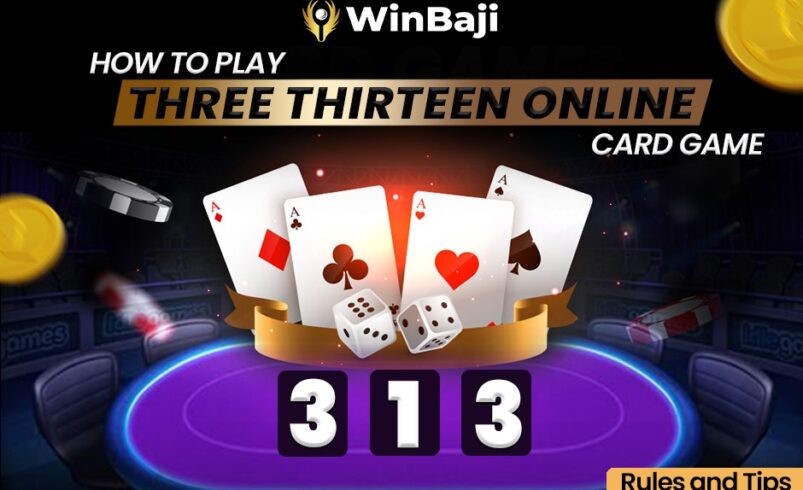How To Play Three Thirteen Online Card Game Rules and Tips

Three Thirteen is among the Rummy-style games, where the gameplay is centred on making all tries get rid of sets and runs. The game is played with two or more players using two packs of cards. He increases the number of cards dealt in each turn to 3 from 13. In addition to this, every round consists of a different “wild” card, which matches the number of cards dealt in this particular round. The game goes for 11 rounds; the winner will be declared to be the one who has the lowest points at the end.
Read More: Top 10 Legends in Kabaddi History
Now that you know the basics of the game Three Thirteen Card Game, let’s discuss its winning techniques.
What is Three Thirteen Card Game?
Three Thirteen is a common card game that, as a matter of fact, is an in-house version of Rummy. It uses the standard deck of 52 playing cards, and it can accommodate between 2 to 6 players. The general objective of the game is to score the given number of points as the first player, mostly 300.
Check Out: Top Online Live Casinos in Dhaka, Bangladesh
To win, players will have to make sets and runs in their hands with the help of wild cards like Jokers and deuces and draw and discard cards wisely. The way of playing, a player can “go out” by getting all his cards melded, and scores are calculated as face value cards.
How to Play Three Thirteen Cards
Three Thirteen is a Rummy card game for two to four players. It can be played with one or more standard decks according to the number of players. The objective of the game involves getting close to zero by making sets and runs of cards on multiple rounds.
How to Form the Deck of Three Thirteen Game
Let’s take a closer look at the rules and setup of the game and how to form the deck.
Three Thirteen Game Objective
The obvious objective of Three Thirteen is scoring fewer points with the formation of sets and runs. Points are scored at the end of every round on any leftover cards. The game goes for a total of 11 rounds, at which the number of cards dealt in the game is increased as from 3 to 13.
3 – 13 Card Deck Preparation:
Three Thirteen is played using an ordinary Anglo-American pack of 52 cards. This pack consists of four suits: spades, hearts, diamonds, and clubs, each with thirteen cards involved. The game will require either one or more, depending on the number of players involved.
Here is a breakdown:
2 Players: 1 pack of 52 cards
3-4 Players: 1 pack of 52 cards
5+ Players: Add 1 pack for every two players
Preparing the Pack
Preparation of the deck: Before a game, one is first required to determine how many decks one will need. After these are assembled, they need to be shuffled. Shuffling has nothing to do with just mixing the cards but making sure there are no patterns visible left from previous games.
Try to reserve wild cards or jokers for each round when initializing. That varies with each round-from threes being wild in round 1 to the last of the eleventh round with Kings as wild. Wild cards make the game interesting because the strategy has to be closely observed since it doesn’t favour anyone over the rest.
Here’s the quick recap:
Number of Decks: One deck for 2-4 players
Shuffle Cards: Is completely random so no pattern will appear.
Choose Wild Cards/Jokers: Alternating per round – in round 1, for example, threes are the wild card, and in round 11, Kings are the wild card.
Check the Deck: Quick Deck Check before actual game play will assures that all the cards required are there.
Knowing the Rounds
In Three Thirteen, every round seems more complicated because the number of cards dealt increases from 3 to 13. In each round, there is a different strategy according to new wild cards in the increasing rounds with threes as wild in Round 1, all the way to kings in Round 11.
Key Round Strategy:
Player Turn: One draw a card from either the deck or discard pile and discard one. In the meanwhile, the players can keep laying down melds (sets/runs) but these melds laid down might never be rearranged.
Early Rounds: There are fewer cards dealt so penalties are less likely to happen. So, the purpose of such early rounds is to quickly form melds with lower value cards.
More Cards: The game becomes challenging as the number of cards increases. Use wilds but prevent the high-value cards that cannot be melded, for you shall add them up to your score.
Challenges in Each Round:
Understand what others in the table have discarded and what they might be doing.
Know how to use the wilds for every round.
Penalties in Each Round
The higher the cards one has remained, the higher their penalty. That is from 1 up to 10 for each card; that is from an Ace to a King.
Aim to end the round with fewer high-value cards to avoid losing more ground.
This is a development that makes Three Thirteen a challenging card game requiring strategic planning.
Dealer Role
Any round of Three Thirteen inherently depends on the dealer to facilitate games for all players that will participate in it. This generally involves dealer selection, which usually is either a random or mutually agreed by players when playing the game for the first time. Regardless of how one may select them, their roles remain significant because they essentially set the tone and pace of each round.
He is responsible for shuffling and distributing cards according to the rules of each round, speeding up the dealing process to ensure silky smooth dealing without critical mistakes that can ruin the flow of the match. They also have some minor perks, such as reading initial reactions by other players of their dealt hands due to the positional rotation moving clockwise after every hand, thus gaining glimpses about a strategy that might use an opponent.
Dealer etiquette is yet another aspect which should never be derogatory and wherein fair play should be maintained at all costs in such a way that no attempt is made to get undue advantage through the illicit measures, like card marking or any other form of deceitful practice that prejudices the spirit of competition implicit in games such as Three Thirteen.
Although this may not seem so at first, being a good dealer involves much more than just passing cards around—it requires vigilance, precision, tact, and above all else, integrity.
Dealing the Cards
Dealing the cards is a moment of change of cards between rounds at the table. A dealer has a number of responsibilities, and these primarily surround ensuring fair play from both players and also cardinality, or equality of numbers of cards.
These involve diverse deal techniques to make sure every player is dealt his opening hand from a well-scrambled pack with efficient methods of scrambling the cards. Dealing of cards, step by step will be performed in a clockwise direction, starting on the left side of the dealer and keeps going until each player has been dealt their minimum share for the round.
The information below summarizes how cards are dealt and how matters of rotation regarding Three Thirteen:
1. Different numbers of dealt cards are there in each round: Round 1 has three cards, but Round 11 has thirteen.
2. Dealer turns after each round in a clockwise direction for better deal of rotation dynamics.
3. Proper shuffling is done before the deal in order that a totally random and unpredictable distribution process goes on.
4. Deal of initial hands continues one after the other, and when everyone gets the stipulated amount, the rest forms a stock from which all the players draw to play along.
5. The equal opportunity principle is upheld since every player will have a chance to play first at least once in the course of the game, showing respect for the canons of fairness to players.
It is not only necessary to know how many cards you get per round but also how these may influence your strategy as the game progresses to dominate the game Three Thirteen. While rounds with fewer cards are a good time for quick discarding, later rounds call for caution in deciding on which combinations to pursue or which combination to keep an eye open for, all taking into account the role played by wildcards in each round.
Read Also: The Rise of Online Betting in Bangladesh: An Overview
But in reality, knowledge of dealers’ functions and duties also unmasks subtleties in game play, such as the optimal moment to discard a card or whether to chip from a pile or simply draw from the box stock, and so forth, so you gain slight advantages over less savvy opponents, making this game, which seems to be quite very straightforward at first, really rich in complexity!
3 – 13 Gameplay: Meld Formation
Meld Formation is one of the most fundamental factors in winning a game of Three Thirteen and requires a sharp eye for Card Placement and Picking Pairs. A meld is a set or sequence of 3 or more cards of the same rank or consecutive ranks from any suit, respectively.
The wild card may replace any other in forming a meld, but be cautious, since penalty points for the wild card are computed on what they represent, and it is between three, when the threes are wild, to ten, for Kings. Strategically constructing your hand with these sequences or sets reduces your penalty point count overall.
The action thickens up with Discard Cards, an important aspect of the game because every turn always concludes with one card being discarded into the discard pile. Be aware of the cards that your opponents discard; perhaps they will let loose with cards that they accidentally are helping you to complete your Strategic Melds! Also, be reminded that playing off of another player’s existing meld is not allowed, so you only need to focus on forming your own combinations.
The number of different Meld Varieties created within your hand is unlimited, keeping in mind that each round includes more cards dealt. Building up the Sequence adds depth and excitement to this game, as it goes beyond merely ridding the game of penalty points-they bring closer to victory.
Make longer runs or greater sets by playing wild cards intelligently, yes, even holding higher value cards if kings become wild to use every one to its fullest potential throughout the rounds.
3 – 13 Wild Cards All Explained
In Three Thirteen, wild cards are crucial for forming winning hands. Wild cards vary round-to-round which can substitute any one card to make a set or run.
How Wild Cards Work
Changing Wild Cards: The wild card changes every round. It will keep matching the number of cards dealt out. For example, in Round 1, the 3s are wild. In Round 2, the 4s are wild, and so on.
Strategic Importance Wild Cards: Wild cards create flexibility in melding. It enables the player to complete his hands early on and thus gives fewer penalty points.
Balance and Timing: Wild cards can be great turning a losing hand into a winning one. However, players must balance the use of wild cards instantly or saving for future rounds.
Wild cards give form to the strategy as well as the pace of each round, making them very important to win the game.
In a card game, if “Wild Cards” are introduced, then an exciting and unpredictable flavour adds to every round of the game as the player strategizes in substituting certain cards with the wild card, thus heightening the strategic value and fun in a game. In this particular game, there exists a special wild card for each of the 11 rounds, and the wild card for a round is determined by the number of cards dealt for that round. Here is how the Wild Cards work step by step:
A definite rank of cards is designated as a wild card for each round of the game – out of the 11 rounds. This means that you can substitute the wild card by any other card in that round when forming groups or sequences. You can even make an entire set consisting only of wild cards if you prefer.
Round-by-Round Explanation:
In the first round, Threes are wild. This implies that any 3 can be substituted for any other card in your hand to form valid combinations or sets.
In the second round, Fours are wild. Now, any 4 can become a wildcard; it can be used in ways that help in creating valid card combinations.
The third round would have Fives as wild. The rule is the same pattern because in this round, 5s can be used as wild cards.
Sixes are wild in the fourth round. The rule is to give the players another opportunity to use 6s as wild cards for great strategic play.
Sevens are wild for the fifth round. This is added to provide another level of unpredictability because Sevens become a substitute for other cards.
Eights are wild at the end of the sixth round, an offshoot of the cards that one can use as wild, wherein the game might transform.
For the seventh round, the nine of any colour becomes wild and opens up a new scope for combinations and strategies.
The eight rounds make the ten of any colour a wild card as well, thereby offering even more possibilities.
For the ninth round, Jacks are wild. This imposes another level of strategy and variation.
In the tenth round, Queens are wild, leading to further dynamics and so changing which strategies players should be playing.
And, finally, for the eleventh and final round, Kings are wild, which closes the cycle of wild cards. This imposes one final level of excitement and variation to the game.
Strategic Depth
The changing ranking of wild cards at every round would require the players to change up their strategies. That is, besides the factor of surprise and skill, the use of one or more wild cards can become a factor to be decided upon and utilized at the right time in the game.
Three Thirteen Variations
Three Thirteen is even more beautiful due to its flexibility whereby, in the world, there exist thousands of Alternate Versions and Rule Modifications that are dispersed in different parts of the globe. Some Unique Variations introduce elements such as having more wild cards or modified scoring systems and thus play out every game experience differently. Cultural adaptations add spice to the game since regional differences in playing card games are depicted.
A list of variations that one should know include
Jokers as Wild Cards
Some rule variations involve Jokers as additional wild cards in the game. If there is a Joker card remaining in a player’s hand at the end of a round, when the Jokers are used, it is scored 20 points.
Ace Value Variations
Aces can be awarded different point values: 13, 15 or even 20. This modification can greatly influence the strategy that a player employs.
High or Low Aces
Variations of the game also sometimes let you use Aces as high or low in a straight up or down series. Now, if you end up leaving an Ace over after a hand, that’ll cost you 15, when it would have cost you one otherwise
Fewer Points for Face Cards
Jacks, Queens, and Kings only score 10 points each instead of their normal values that could impact your hand’s value on face cards.
Special Extra Rounds with Wild Cards
There is also another round, sometimes referred to as the twelfth or thirteenth round in some versions of this card game. In the additional rounds, 14 and 15 cards are dealt for each player, and Aces and 2s are designated as wild cards. This opens doors to variants called “Fourteens” and “Fifteens.”
Jokers as Discards and Zero Points
Some variations of Three Thirteen allow players to place Jokers on any pile of another player, and these placed Jokers are never included in the points at any point.
Ascending and Descending Rounds
The second variation is one in which 22 rounds are played, starting from 3 up to 13, and then again played in reverse order from 13 down to 3. This, hence, adds a thrilling twist to the otherwise traditional pattern of the game.
Discard Pile Choice for Players
Players place their discard card in front of themselves, and the other players get a choice from among various discard piles. This rule accelerates the game.
Redemption Round
Games that allow a “Redemption round” afford the players one last turn after a player has gone out. They may play all melds on his board or deadwood cards on any other board. A player who goes out in the redemption round scores 0 points.
Double Points Rounds
There are some points which are doubled on particular rounds; normally, such rounds consist of rounds 11, 12, and 13. These are the Jacks, Queens, and Kings rounds, where the competition and strategy are highly heightened.
Only Wild Cards Sets
In playing, a player is able to have a set fully consisting of wild cards. This rule creates an interesting element to play with, as this enables players to come up with wild and crazy combinations.
Going Out Mistakes Penalty
If a player goes out wrongly, they may attract a penalty of +20 points, thus deterring early finishes and strictly insisting on the rules of the game.
Double-Naughts Rule
If all the players go out with zero points on a given hand, the hand is replayed as if it never took place, and this adds an element of risk and strategy.
Fixed Negative Scores for First Player
Some Three Thirteen versions include a tiebreaker score for the player who is out first in each round. The most common scoring measures include -5, -10 or some fixed score equal to the wild card, (see above). Here, the value is -8 points for each round since the 8 card is the wild card.
The heart of Three Thirteen is its reliance on Negative Scoring and Score-reduction moves. All the cards in a player’s hand at the end of the round are accumulated onto that score unless they have been used in a meld, which themselves score from 1 point for Aces up to a maximum score of 10 points for Kings.
Wild cards are exceptions; if they remain unmelded at the game’s conclusion, they bear a steep price of 15 penalty points apiece. The cunning art of score management subsumes hundreds of tactics that deal with limiting losses and acquiring gains:
Reduction of Penalty Points
Choose low-numbered cards from the deck or discard pile, as these have fewer penalty points.
Use wildcards wisely! Although they can be very handy for getting melds, recall how much they’re worth as unmelded
Bonus Points
“Going out”, that is, playing the first person to run out of all your cards in any given round earns you bonus points – namely, minus ten to your score.
Rounds where the wild card is a lower-value card are, of course, opportunities to bring down your score significantly with relatively small penalties.
Finally, no style of scorekeeping is set in concrete; different groups will like different styles. There are those who love the old methods of paper and pen for recording, while others will make use of more recent digital solutions such as mobile apps or online platforms.
Regardless of the Scorekeeping Method you prefer, recording a running count is the critical part not only in determining the winner but also in assisting players in selecting which cards to keep and which to discard at each stage. Remember that, unlike almost all games where winning is attributed by having the High Score, winning this game occurs through skillful working out of the best possible Player’s Score End.
How to Win the Three Thirteen Game
There’s a combination of strategy, time, and how well you read your opponents to win Three Thirteen. Here are some key tactics that should help ensure winning for you:
Winning Strategies
1. Cut Penalty Cards: Remove high-value cards such as Kings during the early stages while it’s impossible to meld them together. Retain the low-value cards and limit the penalty.
2. Maximize Wild Card Usage: Every round has a different wild card—use them well to create sets or runs for an increased chance of going out first.
3. Read Opponents: Observe which cards other players discard in order to gain insight into their strategy. The time to bluff will have to come, as well as guess what they are likely to do.
4. Adjust according to Complexity Level in Round-As the rounds get more complex and there are more cards, you should be thinking of making bigger melds and reducing your unmelded hand.
5. Bluff and Observe: Know how opponents change their degree of risk and strategy once they start feeling the blows.
Since you now have control of the mathematical as well as the psychological aspect of the game, you will always outsmart your opponents in winning Three Thirteen.
3 – 13 Game Strategy Tips
Bluffing skills are a must in the game Three Thirteen, as here you need to keep your intentions at bay while letting others expose their strategies. A smart player will know when to bluff about going out and when to bluff on having wild cards to befuddle your opponent.
Also, Strategic Discarding has been a crucial characteristic in the game as it removes high penalty point cards that don’t come to possible melds at the starting stages of every round.
In terms of Meld Optimization, it’s sensible to aim for runs rather than sequences as you move through rounds of play because wild cards may play much more freely. Forming sequential numbers in a suit frees up what would otherwise be “wild” to fill other potentials you might not otherwise have been able to form.
Predicting moves next, watch closely! Keep track of which cards are coming out of the discard pile with an opponent’s picks because it’s information to you about possible melds they might have in hand or be trying to build.
In addition, your Round Strategy should be aggressive in the early rounds-the fewer the cards, the fewer the penalties and potential losses. Later rounds, as the number of cards will increase, you should play defensively because greater card counts enhance penalty points if those cards remain unmelded at scoring at the end of a round.
Reading Opponents: Read opponents. Observe how they respond when particular cards are drawn — are they pleased or upset? Can be a clue about what they hold or need. Card Counting is a fantastic advantage and is most effective in late rounds. Knowing the rest in the draw deck can help estimate how probable it is that gets some needed cards.
Remember, Three Thirteen is not only about making luck but how well you may use that luck. So, knowledge about these strategic insights will enhance gameplay with much better chances of winning.
Frequently Asked Questions
Is Three Thirteen playable with more than four players?
Yes, it is possible to play Three Thirteen with more than four people. However, the number of additional decks needed to be included will depend on the number of extra players to ensure that there will be adequate cards during each round for a balanced distribution of cards. Of course, remember that this can slightly alter the nature of the game and one’s prospects of winning because of interactions in dealing with many people.
Are there jokers in Three Thirteen?
Yes, jokers and twos (2s) are wild cards and must be used.
Can a player “go out” in the middle of the 3 – 13 game?
Yes. A player can “go out” by laying off all her cards, which ends the game. The last discard must be part of a valid set or run.
What happens in the 3-13 final rounds?
The final round of three thirteen: once a player reaches the agreed-upon point goal, every other player gets one more turn to improve his hands.
How is the winner determined in three thirteen?
The player who has the minimum at the end of the final round is declared as winner in three thirteen. A player wins instantly if he reaches the point goal exactly.
Conclusion
Being an exclusive game that combines both strategy and chances, Three Thirteen never comes to an end because there is always something up to the very end for entertainment players. While experiencing the 11 rounds of excitement, your skill in making melds and wild cards builds up that increases interest in playing it. To excel in Three Thirteen, it demands skills not only in the rules but strategic planning with simultaneous thinking. So whether you are an old user or a freshman, so to speak, remember that great practice with just the right amount of strategy will help you triumph over this thrilling card game.

Find the game by downloading Winbaji Rummy application on Android or iOS. Practice in free Rummy tournaments and take advantage of incredible bonus offers. Start your journey and win big today!








